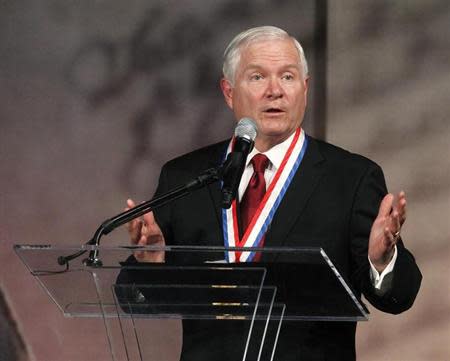Obama must carefully calibrate Russia response, rhetoric: Gates
By Phil Stewart WASHINGTON (Reuters) - President Barack Obama needs to look "two or three moves out" as he weighs his response to Russia's seizure of Ukraine's Crimea Peninsula, which Moscow is unlikely to soon reverse, Obama's former defense secretary, Robert Gates, said on Sunday. Gates, a Russia expert and former CIA chief, portrayed a difficult path for Obama in which European allies may "huff and puff" but fail to match rhetoric with strong action and where Russian President Vladimir Putin feels he has the upper hand. "From Putin's standpoint, he's in the catbird's seat. He's put himself in a position where we need him in terms of the Syrian chemical (weapons) deal. We need him in terms of the Iranian nuclear program," Gates, who served as defense secretary from 2006 to 2011, said in a telephone interview with Reuters. "We need the Russians in terms of getting our (military)equipment out of Afghanistan." Gates is known for his straight talk, including in a new memoir where he criticized Congress and accused Obama, at one point, of not believing in his own Afghan war strategy. In his book, Gates described Putin as a man of Russia's past, "haunted by lost empire, lost glory and lost power." Asked how he would advise Obama in the crisis in Ukraine, Gates pointed to lessons from Russia's war with Georgia in 2008, when he said Washington wanted to react with more forceful economic and political measures than EU allies did. "We ran the risk of being the ones who would be isolated because we favored a much more aggressive response than any of our (European) allies did," said Gates, who was President George W. Bush's defense secretary at the time. "So that's one of the things the president's got to look out for." Indeed, the European Union is not expected to match the United States in threatening sanctions against Russia when its foreign ministers meet to discuss Ukraine on Monday, instead pushing for mediation between Moscow and Kiev, officials say. Ukraine mobilized for war on Sunday and Washington threatened to isolate Russia economically after Putin declared he had the right to invade his neighbor. Russia is the EU's most important trading partner after the United States and China, with 123 billion euros ($170 billion) of goods exported there in 2012. It is also the EU's most important single supplier of energy products, accounting for more than a quarter of all EU consumption of oil and gas. Gates said Obama also needed to be mindful of his rhetoric in the days ahead, noting that "the stronger the rhetoric, the greater expectation of strong action - even if it's limited (to) the political and economic arena." If Obama moves ahead with any punitive actions like sanctions, it is important to consider what it would take to reverse any of them down the road. Obama must consider whether Moscow would need to take some step or make some gesture first. "The challenge is to look two or three moves out and see: If you do this, what will they do? ... And will you have any allies or supporters when you do this?" he said. The standoff in Ukraine has created the greatest moment of tension between Russia and the West since the collapse of the Soviet Union in 1991, an event Putin once called the worst geopolitical catastrophe of the 20th century. Gates did not specifically prescribe any course of action. He said he did not see Putin backing down on Crimea and that the question was whether Moscow might look to eastern Ukraine. "That's sort of the next shoe. And the question is whether Putin stops where he is with the Crimea or whether the Russians take the next step and 'liberate' eastern Ukraine," he said. (Editing by Mohammad Zargham)



